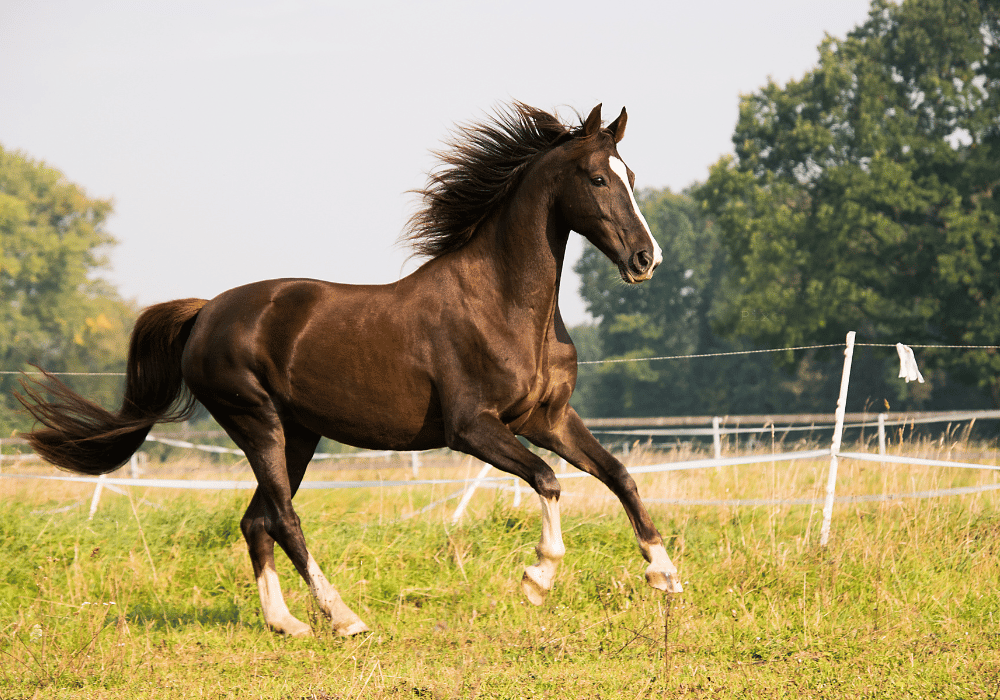Osteoarthritis (OA), also known as degenerative joint disease (DJD), is a common condition that affects horses. It is a progressive and chronic disease that affects the joints, causing pain, inflammation, and reduced mobility. Equine osteoarthritis can have a significant impact on a horse's overall well-being and performance, but it is manageable with early intervention.
In this blog on osteoarthritis in horses, we will explore various aspects of this condition including its causes, symptoms and diagnosis as well as the options available for managing equine osteoarthritis.
What Causes Osteoarthritis in Horses?
Osteoarthritis occurs when the protective cartilage in the joints begins to break down over time. As joint cartilage does not have its own blood supply, it cannot rebuild itself once it is damaged. This creates friction and inflammation in the affected joints, leading to pain and discomfort for the horse. Osteoarthritis is most commonly seen in weight-bearing joints such as the knees, hocks, fetlocks, and stifles. However, it can also affect a horse’s neck and back.
There are several factors that can contribute to the development of osteoarthritis in horses. These include age-related wear and tear on joints and previous injuries or trauma to the joint area.
Symptoms of Osteoarthritis in Horses
Recognising the signs of equine osteoarthritis is important for early intervention and management. Horses with this condition may exhibit lameness or stiffness in affected limbs, reluctance to move or exercise normally, swelling or heat around affected joints or decreased range of motion in joints during flexion tests or palpation. However, the symptoms of osteoarthritis in horses are often very subtle in the early stages. For example, the horse may seem a little stiff during exercise, but this may fade once the horse has warmed up.
By having your vet investigate any lameness - however mild it may appear - you can help your horse remain comfortable for longer. This in turn enables the horse to maintain quality of life for longer than if the condition is allowed to deteriorate.
Treating and Managing Equine Osteoarthritis
Osteoarthritis cannot be cured, but it can be managed so that the horse remains comfortable. Many horses with osteoarthritis continue to compete and remain in full work. However, regular and consistent exercise, medication and careful management are all required to keep the horse sound and comfortable.
There are several medications which may be prescribed to help manage osteoarthritis. These may include non-steroidal anti-inflammatory drugs (NSAIDs) such as bute or Danilon, corticosteroid joint injections, Arthramid joint injections or Cartrophen may be administered to help keep the horse comfortable. However, the type of medication prescribed will depend on the severity of the condition and whether the horse is competing. Some medications and joint supplements used to manage osteoarthritis are not competition legal.
Lameness Examinations at Avonvale Equine Vet Practice
Lameness is a common issue that can significantly impact a horse's performance and overall well-being. Our dedicated team of experienced equine vets provide comprehensive lameness investigations using our excellent diagnostic facilities.
During a lameness examination, our vets will take a detailed history of your horse and carry out an examination of the horse at rest. This will usually include palpation, feeling for any heat, swelling or abnormalities. We will then view the horse walking and trotting in hand and carry out any relevant flexion tests. Depending on the nature of the lameness, we may then ask to see the horse on the lunge and under saddle.
Once the lameness has been identified, we will then use nerve blocks and / or imaging to isolate the underlying cause of the lameness. Our equine vets are equipped with portable x-ray and ultrasound equipment in addition to the facilities available at our equine vet clinic near Banbury.
If you suspect your horse may be experiencing any form of lameness or require further information about our services at Avonvale Equine Vet Practice, please do not hesitate to contact us on 01295 670 501. Register your horse, pony, donkey or mule with us today.








